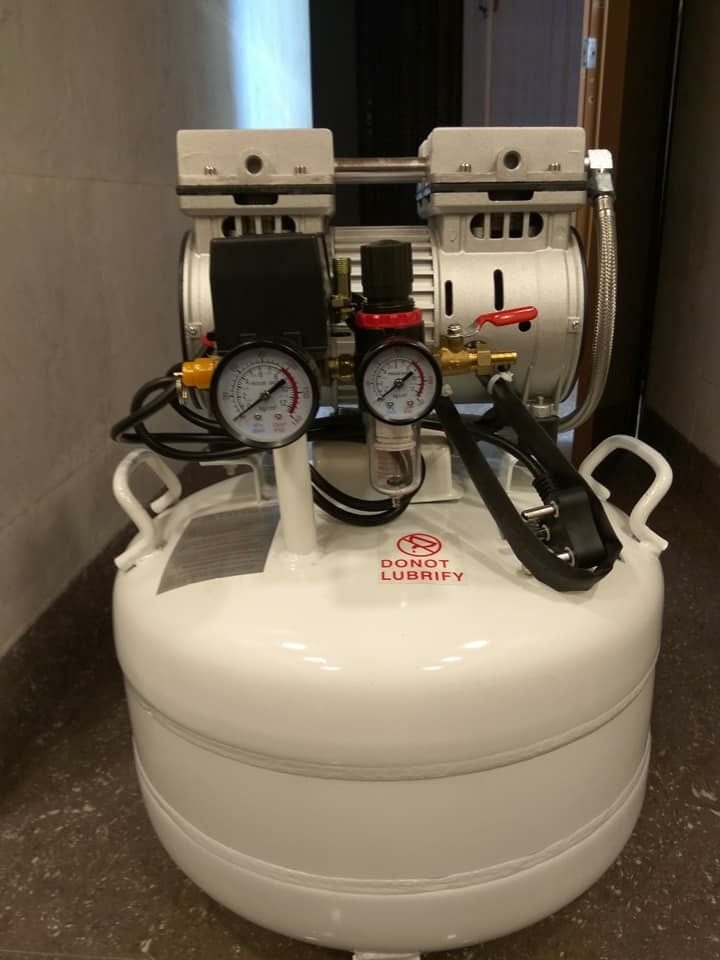-
Call
-
Whatsapp
9825014048
-
Location


Blog


BLOG

Dental Oil-free Air Compressors
The top priority in dentistry is ensuring the safety and comfort of patients. Providing a sterile environment is crucial for successful outcomes, from routine cleanings to complex procedures. Air quality is one often overlooked aspect of maintaining cleanliness in dental practices. Dental oil-free air compressors are vital in providing clean, contaminant-free air for patient safety. In this blog, we dive into the significance of dental oil-free air compressors and their contribution to maintaining a sterile environment in dental offices.

The Importance of Clean Air in Dentistry:
The air quality in dental offices directly impacts patients' and staff's health and safety. Contaminants such as oil aerosols, moisture, and microbes can pose significant risks if not adequately controlled. For patients undergoing procedures, inhaling contaminated air can lead to respiratory issues or infections. Additionally, airborne contaminants can compromise the integrity of dental materials and equipment, affecting treatment outcomes. Therefore, it is imperative to uphold air quality that is pure and devoid of pollutants to uphold the utmost patient care and safety levels.
The Role of Oil-Free Air Compressors:
Oil-free air compressors are designed to produce air free from oil aerosols and other contaminants. Unlike traditional compressors that use oil lubrication, oil-free compressors utilise alternative methods, such as dry lubricants or oil-free designs, to prevent oil contamination in the compressed air stream. This ensures that the air delivered to dental instruments and equipment is clean, dry, and safe for patient care.
Advantages of Oil-Free Air Compressors in Dentistry:
Patient Safety: By eliminating oil contamination, oil-free air compressors help minimise the risk of respiratory issues and infections associated with inhaling contaminated air during dental procedures.
Equipment Protection: Clean air is vital for maintaining the integrity and performance of dental instruments and equipment. Oil-free compressors prevent oil residue from damaging sensitive components, ensuring reliable operation and prolonging equipment lifespan.
Regulatory Compliance: Compliance with air quality regulations in healthcare facilities is governed by numerous regulatory bodies, not to mention the FDA and the Centers for Disease Control and Prevention. Using oil-free air compressors helps dental practices comply with these regulations and maintain accreditation.
The Impact of Contaminated Air on Dental Procedures:
Contaminated air in dental settings can have far-reaching consequences beyond patient health. During procedures, airborne contaminants can compromise the quality of dental work by interfering with bonding agents and adhesives. For example, oil aerosols can contaminate dental restorations, leading to premature failure or complications. Moreover, polluted air can hinder the visibility of the treatment area, making it challenging for dental professionals to perform procedures accurately. These issues affect patient outcomes and increase the likelihood of rework and additional costs for dental practices.
Ensuring Compliance and Accreditation:
Both patient safety and regulatory compliance/accreditation depend on consistently high levels of clean air. Like other healthcare facilities, dental offices are subject to regulations established by organisations like the FDA and the CDC to guarantee patient safety and proper treatment. Penalties, revocation of accreditation, and harm to the dental practice's credibility may ensue from non-compliance with these requirements. Dental offices that purchase oil-free air compressors show they are serious about providing patients with the best care possible and satisfying regulatory requirements.
Future-Proofing Dental Practices:
As advancements in dental technology continue to evolve, the demand for clean and contaminant-free air will only increase. Emerging technologies such as laser dentistry and 3D printing rely heavily on precise air quality to ensure optimal performance and outcomes. By investing in oil-free air compressors now, dental practices can future-proof their operations and remain at the forefront of innovation in the dental industry. Additionally, with growing awareness of infection control and patient safety, oil-free compressors can be a competitive advantage, attracting patients who prioritise a safe and sterile environment for their dental care.


FAQs

Frequently Ask Questions
Oil-free air compressors are essential in dental practices because they prevent the introduction of oil aerosols and contaminants into the compressed air stream used for dental procedures. This helps maintain a sterile environment crucial for patient safety and prevents potential health risks from inhaling contaminated air.
Oil-free air compressors are designed to eliminate oil lubrication, which is common in traditional compressors. Instead, they utilise alternative methods such as dry lubricants or oil-free designs to produce compressed air free from oil aerosols. This ensures that the air delivered to dental instruments and equipment is clean and contaminant-free.
While oil-free air compressors may have a higher initial cost than traditional compressors, they offer long-term benefits that justify the investment. Oil-free compressors require less maintenance, as there is no need for oil changes or filtration systems to remove oil contaminants. Additionally, they help prevent costly equipment damage and downtime associated with oil contamination.
How often you should service your oil-free air compressor depends on factors like how you use it, the weather, and the manufacturer's recommendations. Generally, regular inspection and servicing are necessary to ensure optimal performance and longevity. This may include checking for leaks, monitoring air quality, and replacing filters.
Oil-free air compressors are suitable for many applications beyond dentistry. They are commonly used in pharmaceuticals, food and beverage, electronics manufacturing, and laboratories where clean, contaminant-free air is essential. Additionally, oil-free compressors are favoured in environments where oil contamination could compromise product quality or safety.
